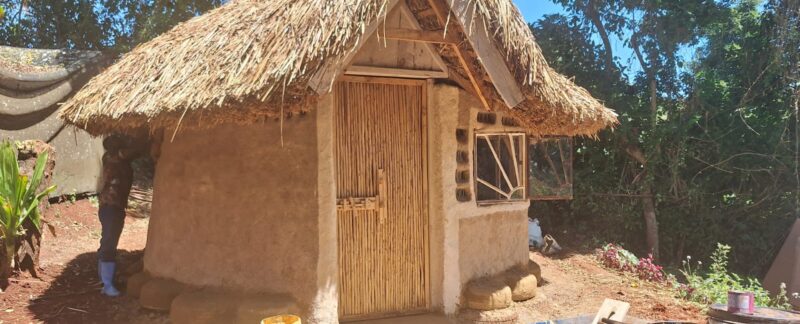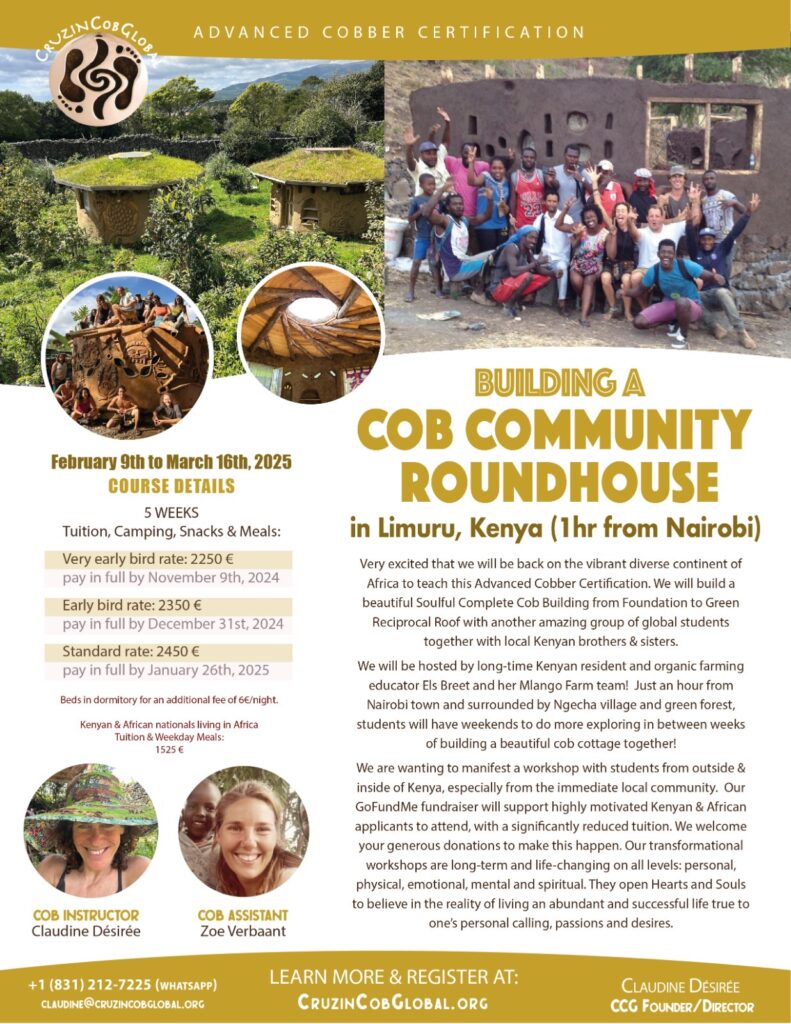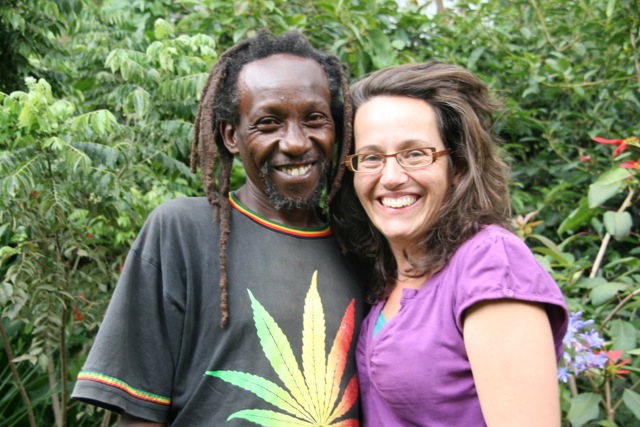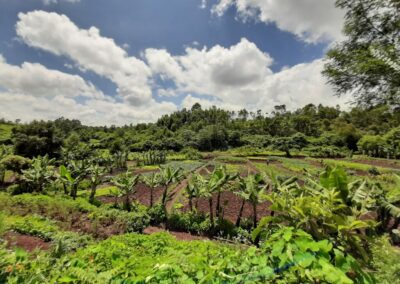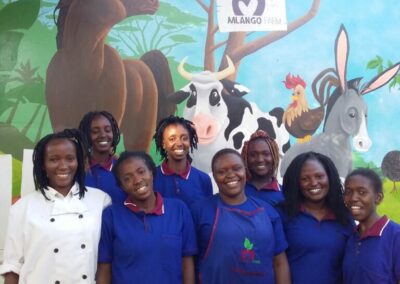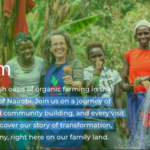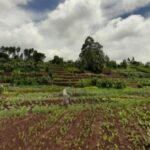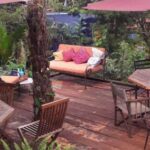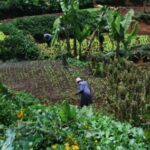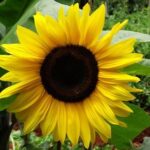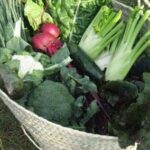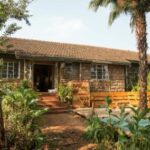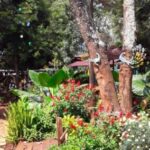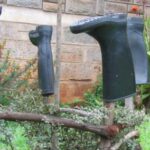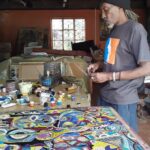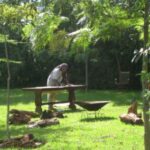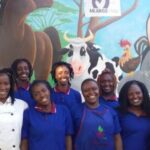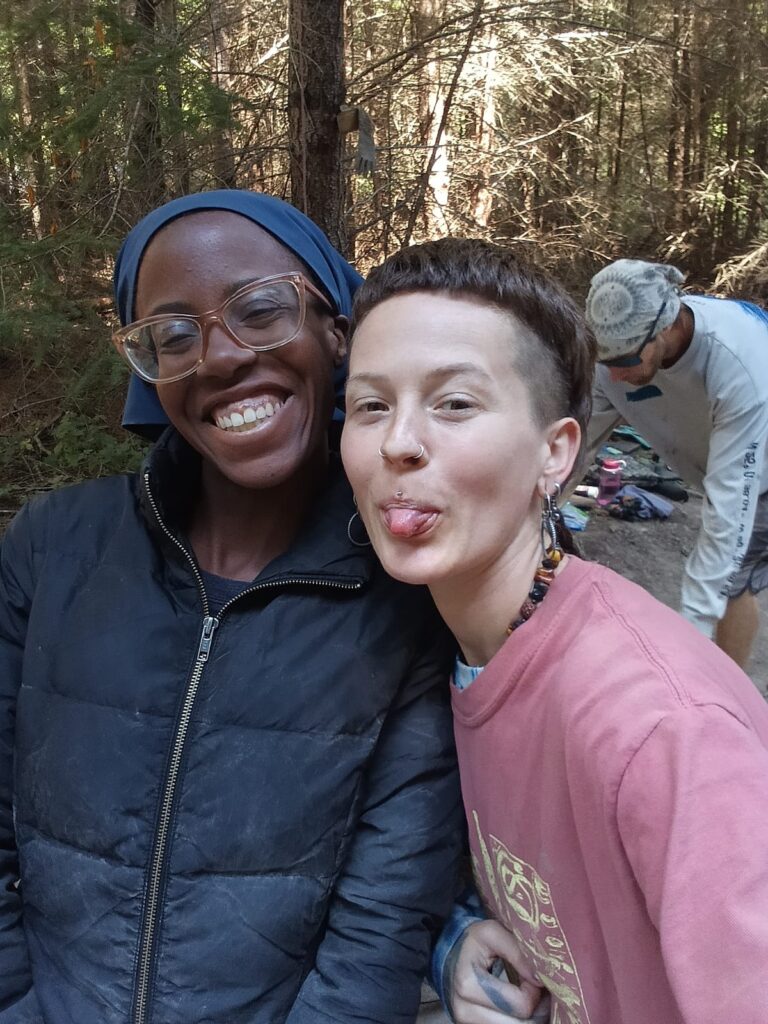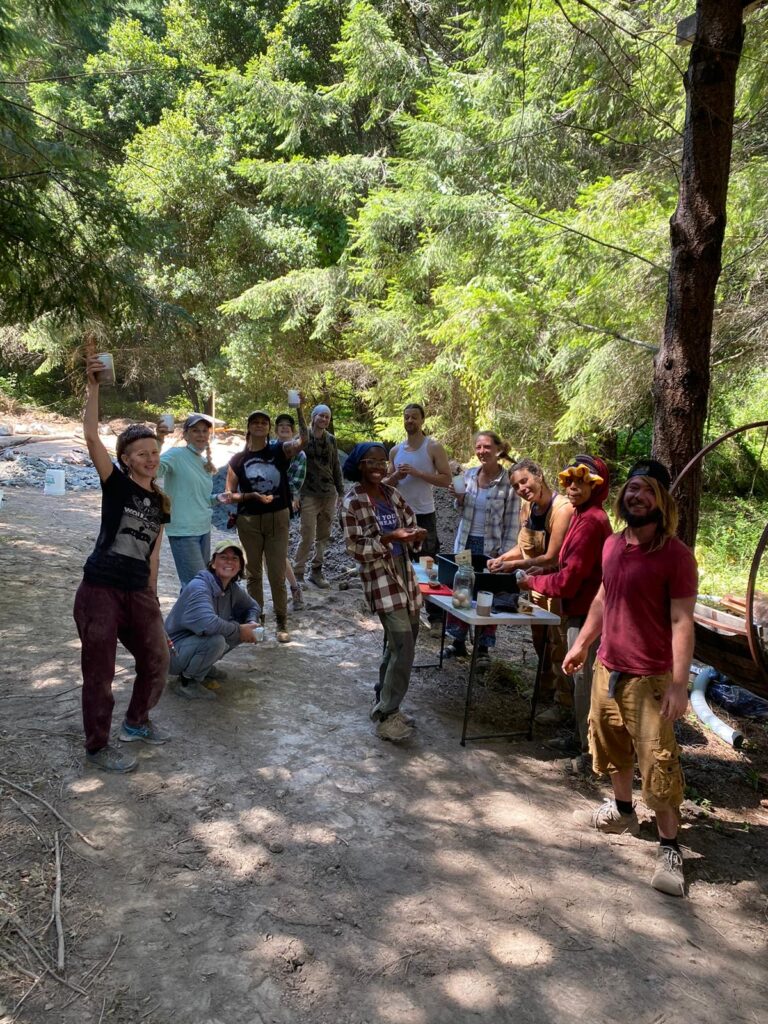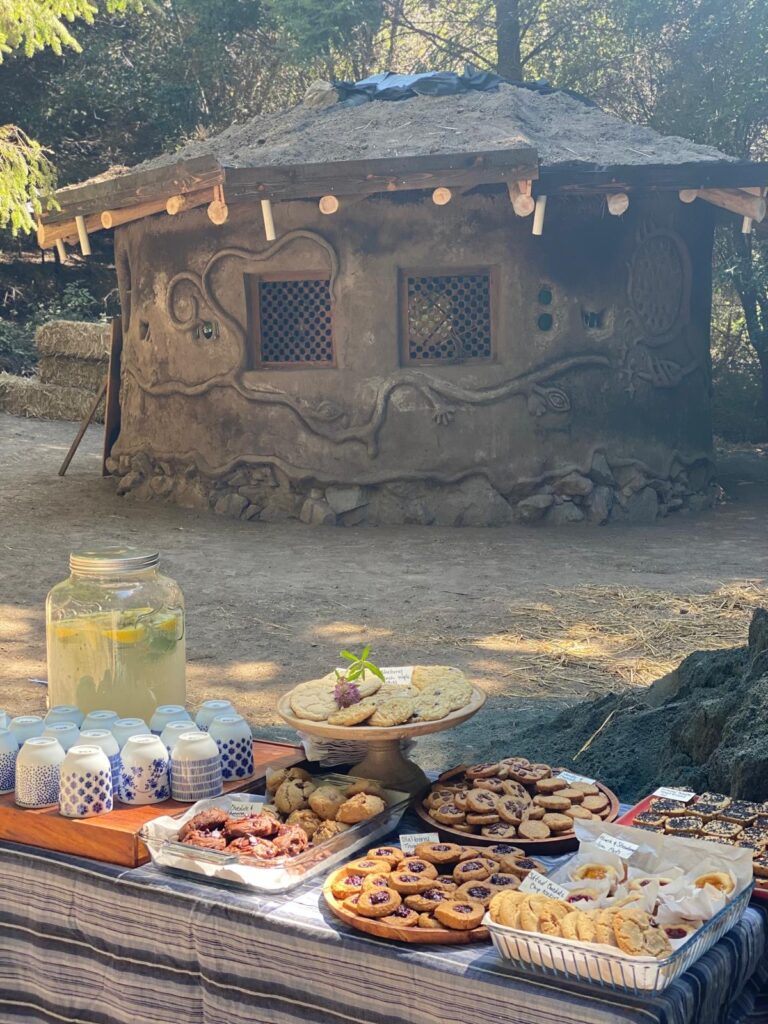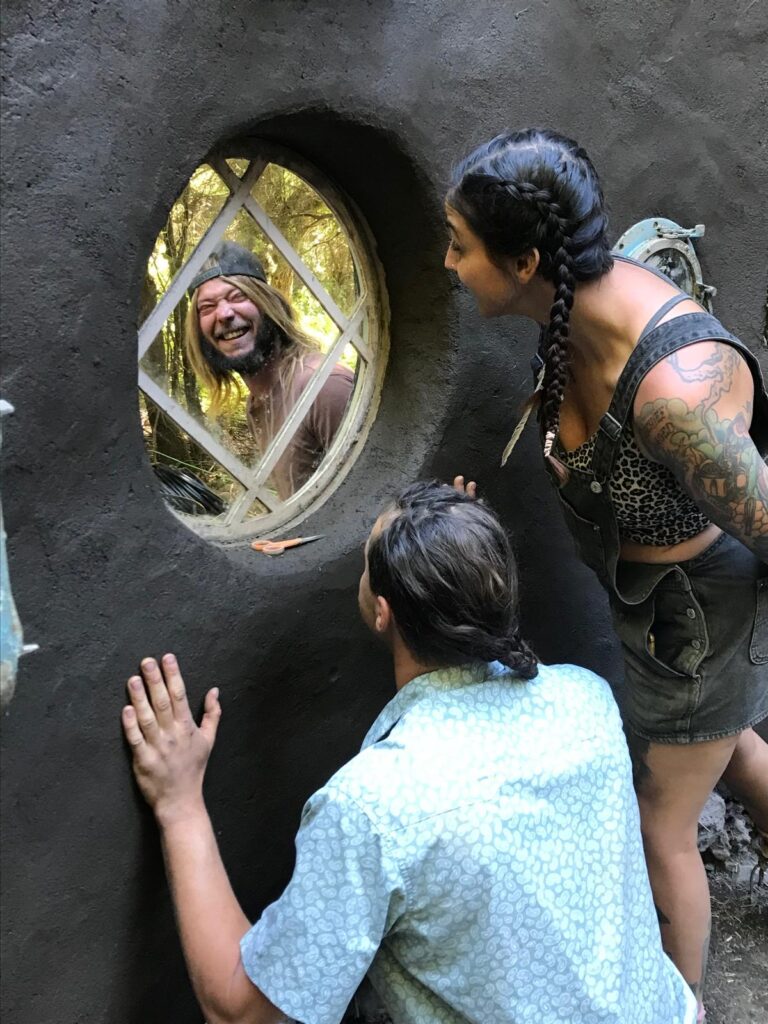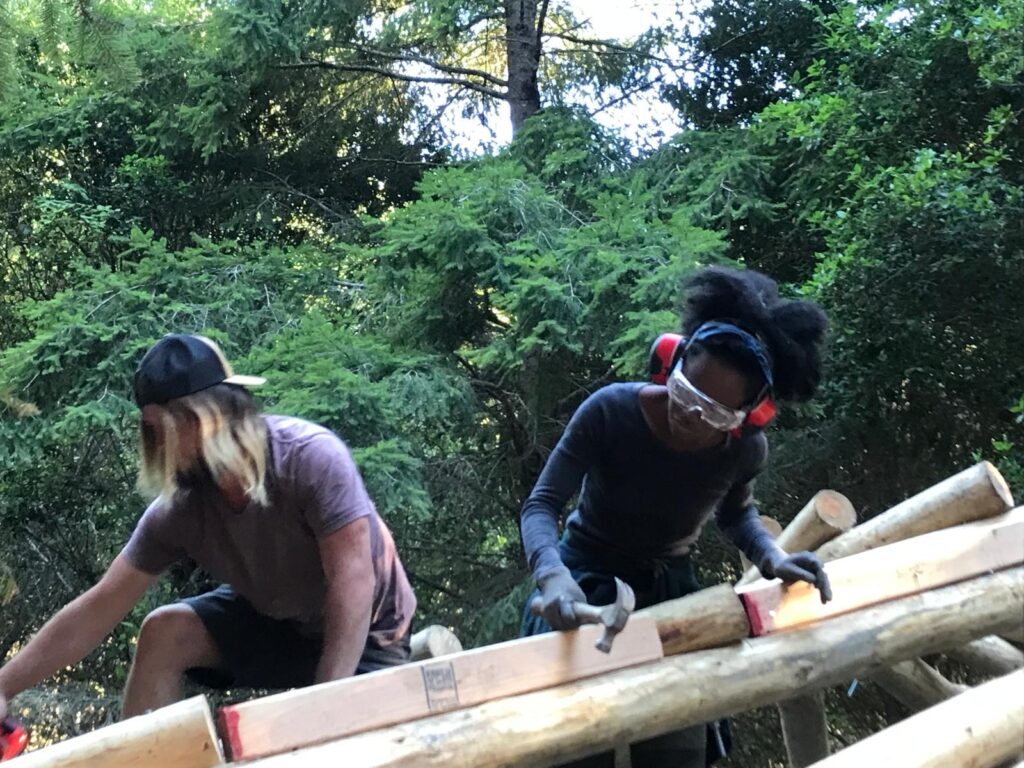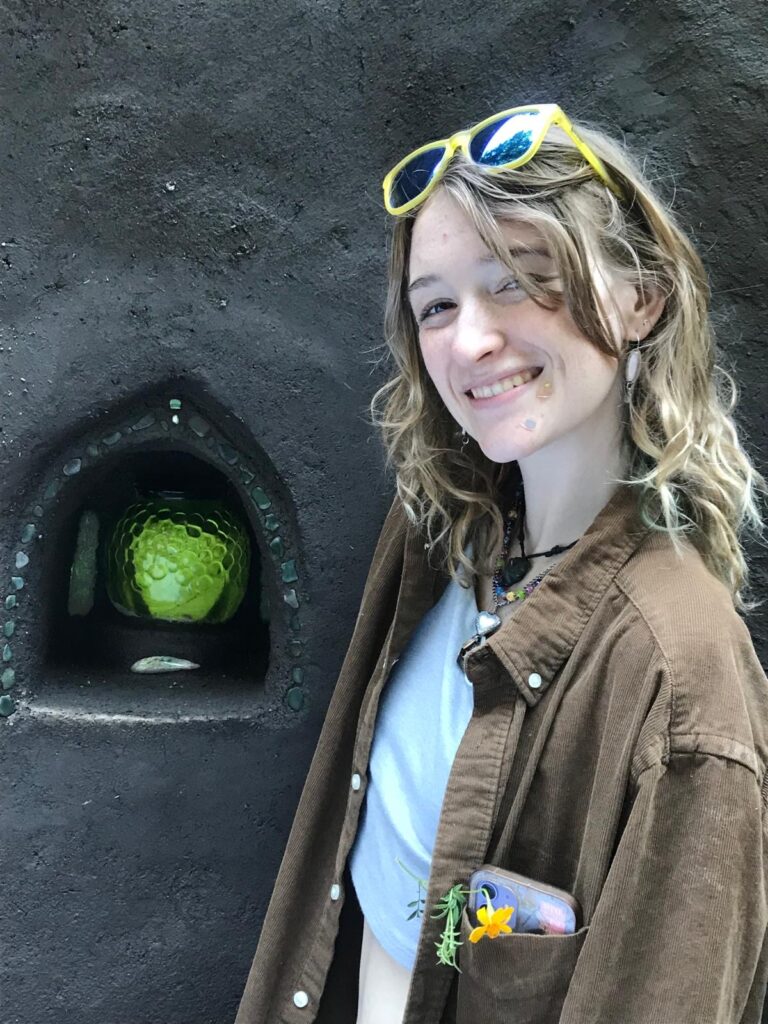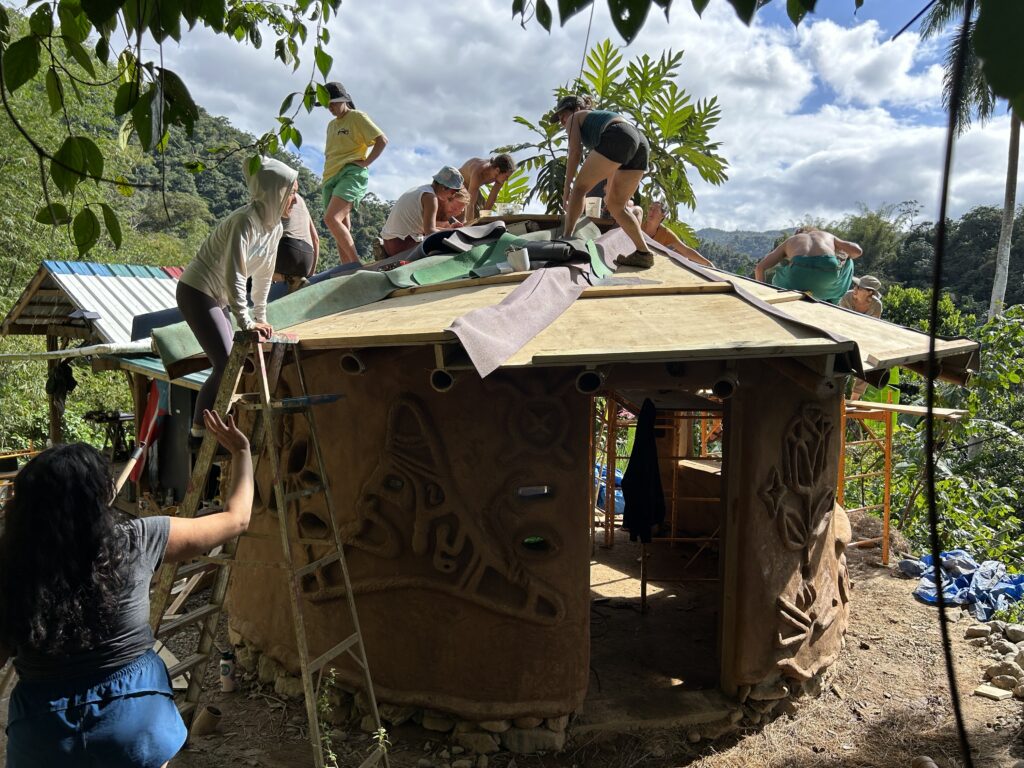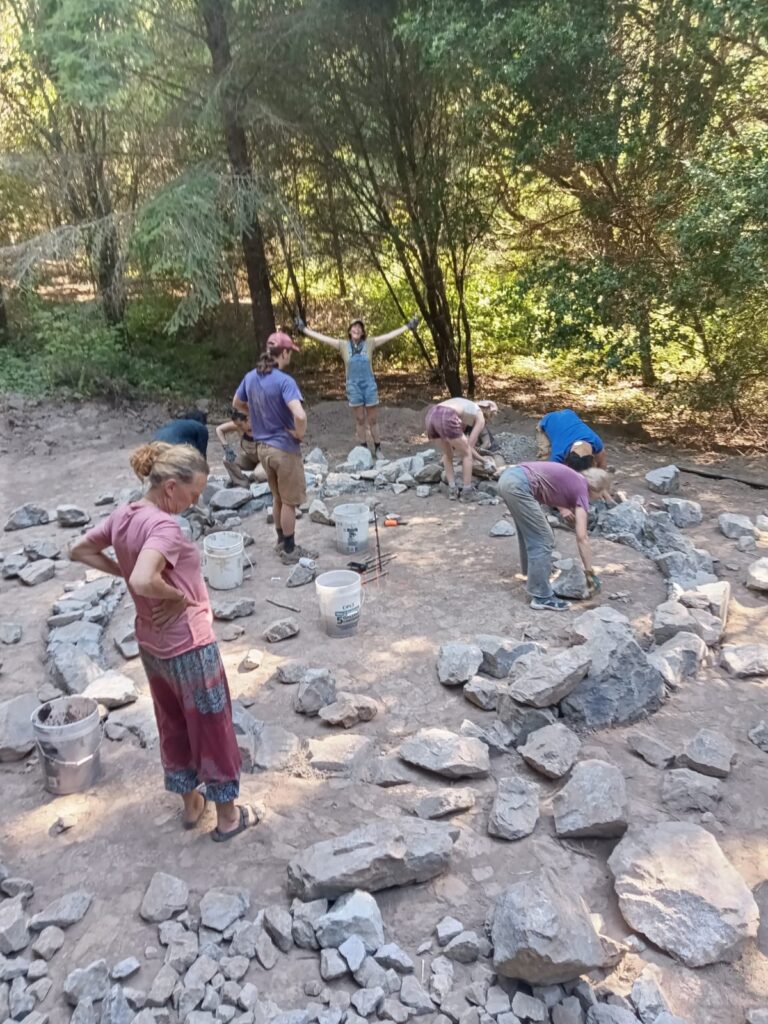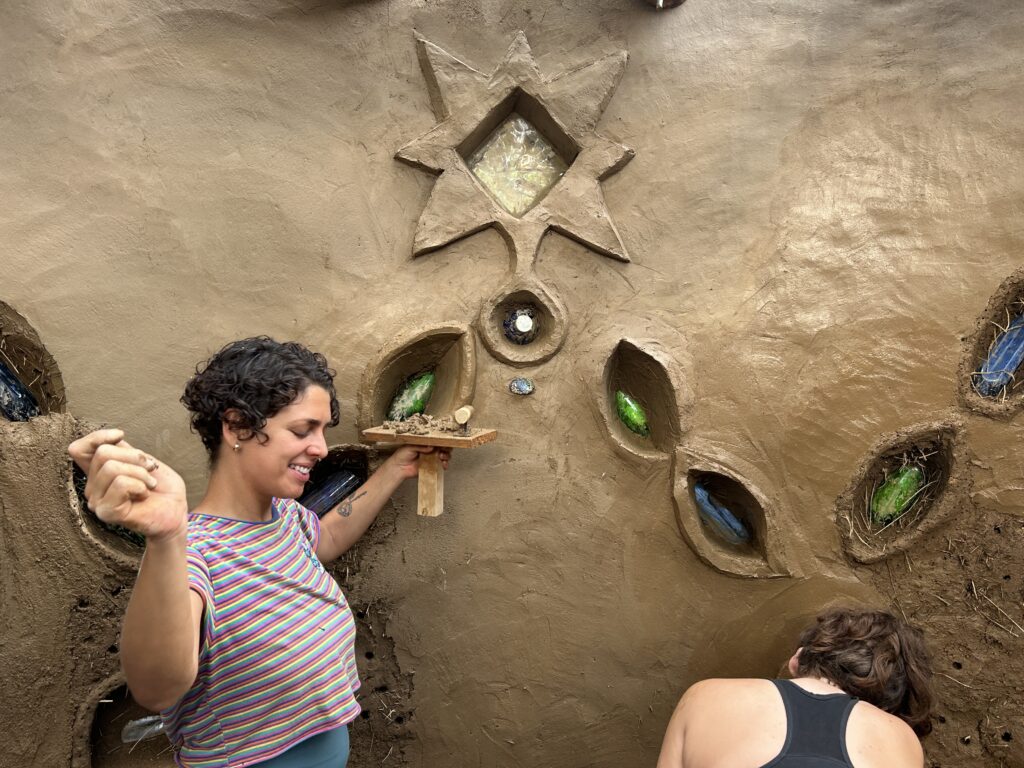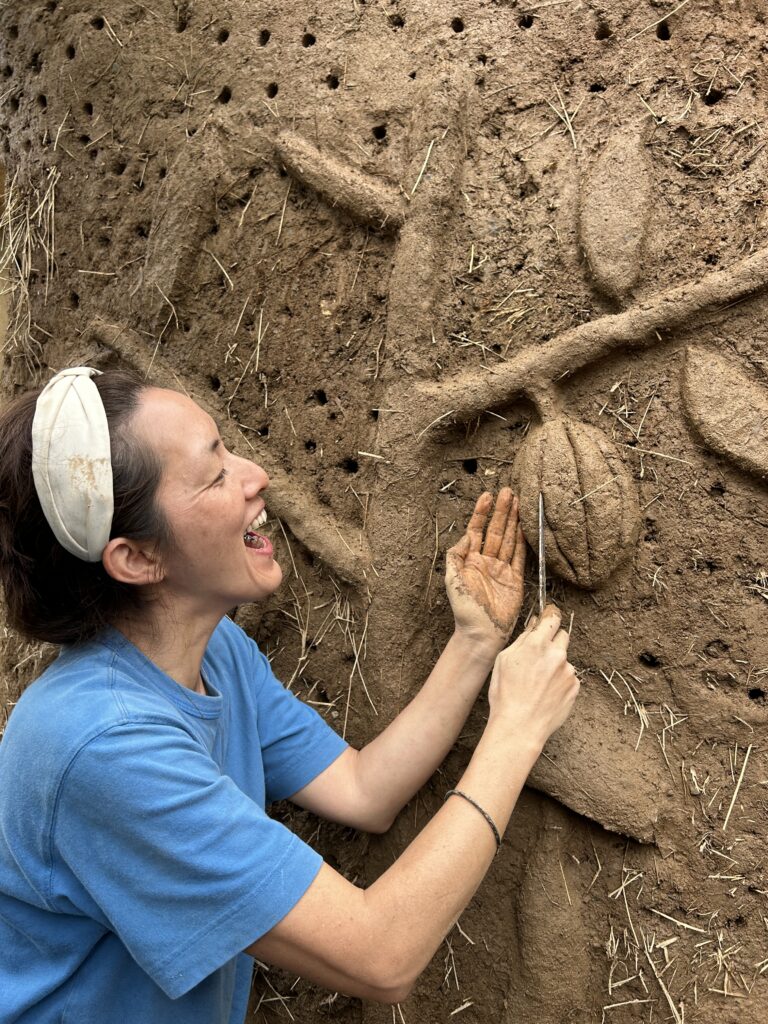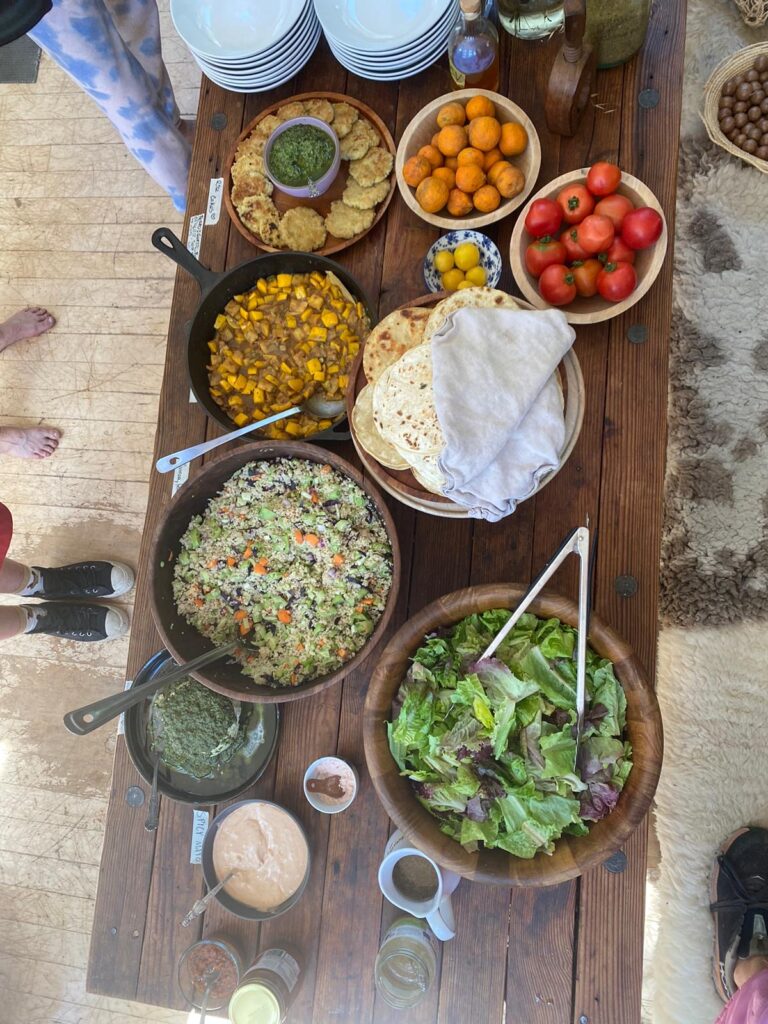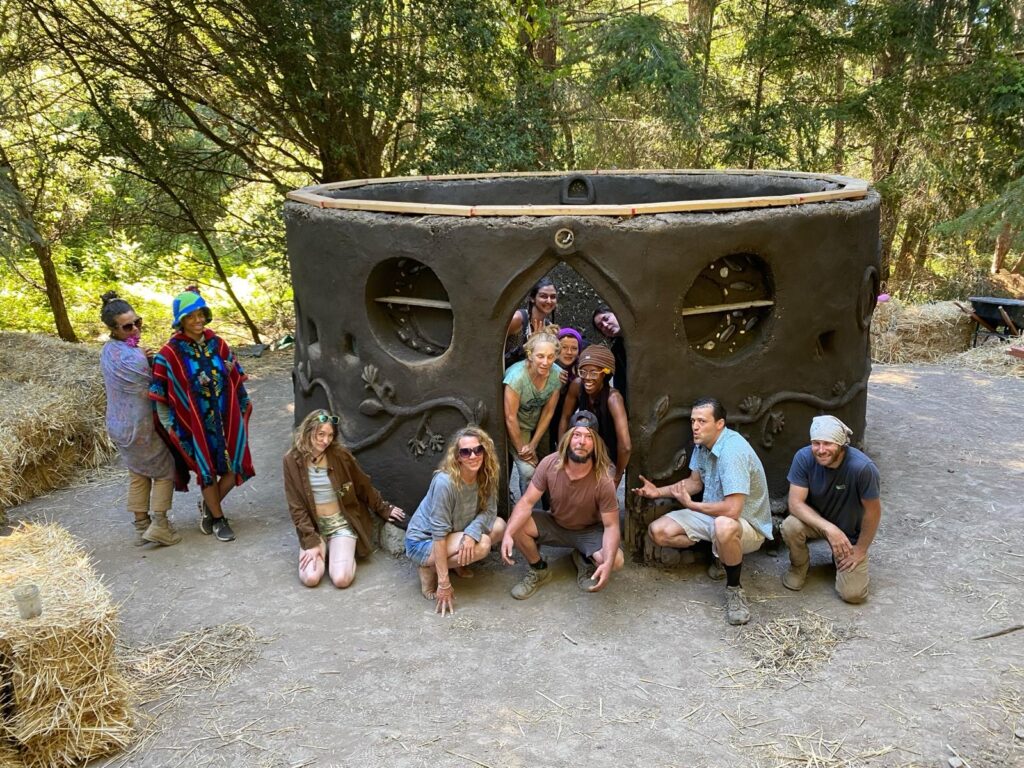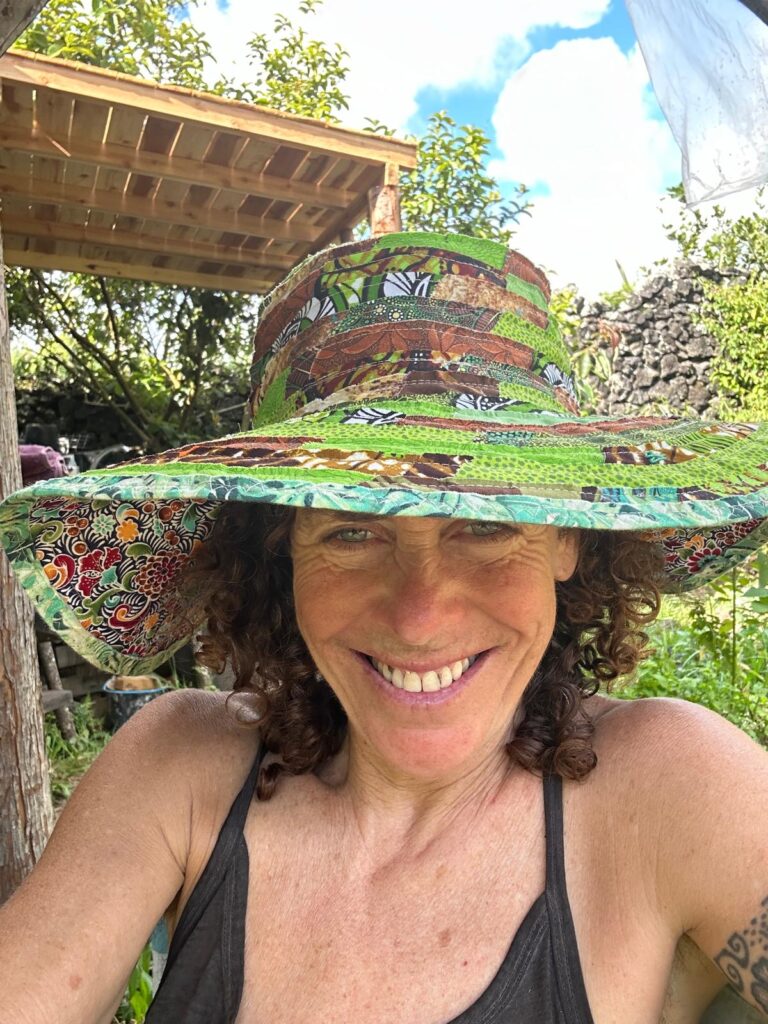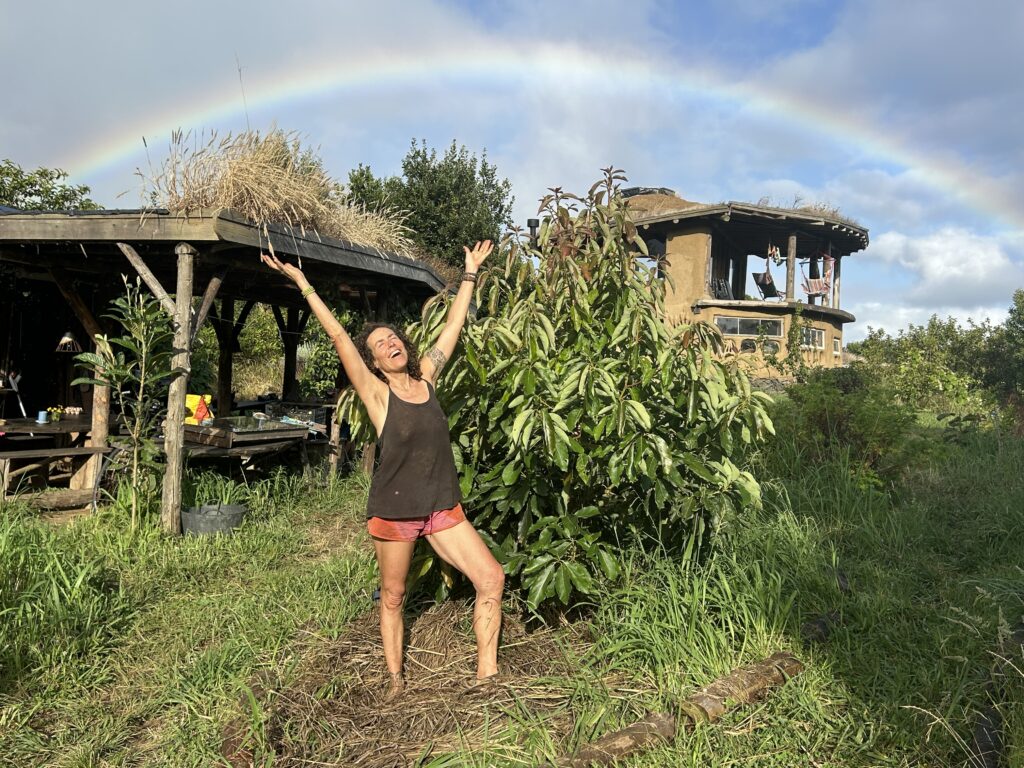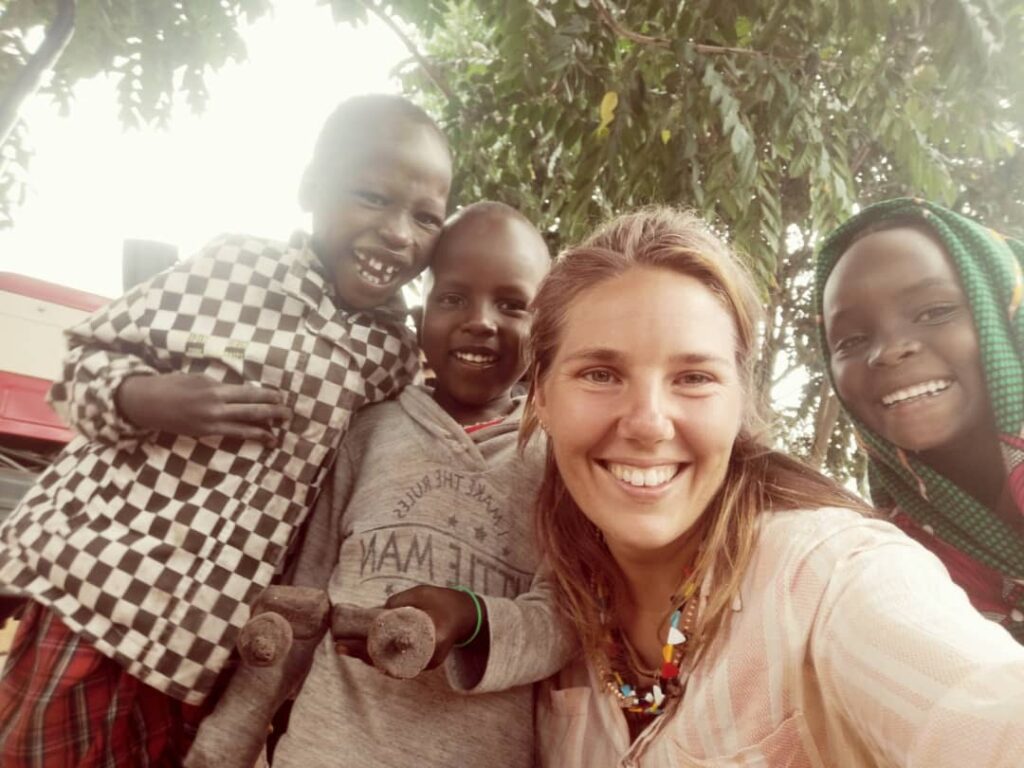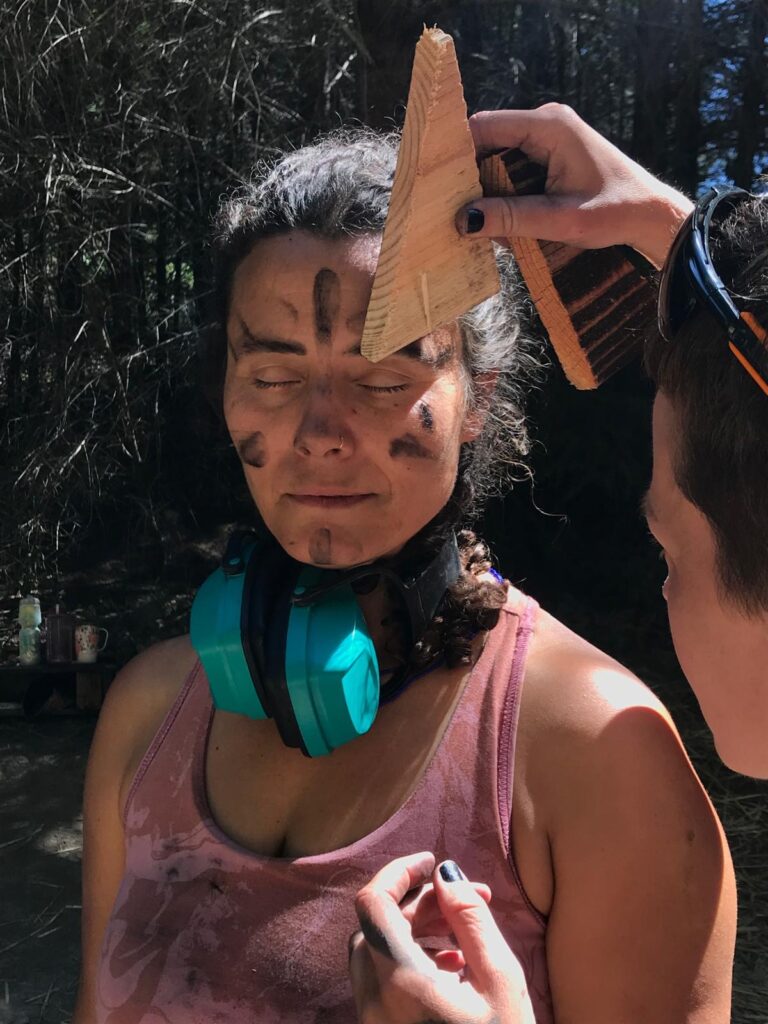Date/Time
Date(s) - Sunday, February 9, 2025 - Sunday, March 16, 2025
8:30 am - 5:30 pm
A PERSONAL WORD FROM CLAUDINE….
I am so excited that CruzinCobGlobal will be back on the vibrant and diverse continent of Africa after an 8-year hiatus. We led several multicultural Cob workshops in Senegal and Morocco between 2015 & 2016, building bungalows and ovens, and half a dozen full-builds between 2016 and 2022 in Cabo Verde, the African islands off the coast of Senegal. Now we have a long-awaited opportunity to be hosted in East Africa, in the Limuru region of Kenya, just outside of Nairobi, by Els Breet and her Mlango (door to a better world) Organic Farm crew. We are wanting to create a workshop consisting of students coming from Kenya, other parts of Africa, and of course from the immediate local community.
OUR HOST
Mlango Farm was started in 2007 on the Mundia family land in Ngecha by Els Breet Kamande and her late husband, Kamande Njenga (1960-2023). Kamande’s broad business experience, sense of hospitality, his knowledge of Kenya and its people together with Els’ work experience in international diplomatic, environmental and educational institutions proved a good base to start a farm together. Over the years a neglected farmland was turned into a heaven on earth, a beautiful organic farm with over 50 different types of crops growing, providing a livelihood for people from the Ngecha community. The passion and love for the project can be seen and felt when guests are visiting the family home at Mlango Farm.
We are developing a natural playground in the forest. For over 17 years, we’ve been pioneers in Kenya, growing organic vegetables with love and care. We’ve welcomed over 10,000 children, mostly from the bustling city of Nairobi, and shown them how we work in harmony with nature—because we believe their future depends on it.
But we’re dreaming even bigger. Our new goal? We want to give far more than 10,000 children the chance to experience nature, to taste it, to smell it. We want to create a large natural playground to explore, be creative and learn in and from nature. And that’s just the beginning.
Mlango Farm supports the Mlango Farm Foundation, an organization that offers school visits and various courses on agriculture on the farm. The educational work of the Mlango Farm Foundation is supported by the Stichting Mlango Farm in The Netherlands.
Mlango Farm grows in a sustainable way, following the rule of the 5 R’s: we Refuse, Reduce, Recycle, Re-use, and Rot our resources as much as we can. We make and collect Ecobricks (building blocks made of plastic waste) to reduce the amount of plastic waste in our environment. Soon we will build a cottage made of ecobricks and cob. We will be happy to tell you more about it!
At Mlango Farm we aim at a sustainable way of farming, without using chemical pesticides or 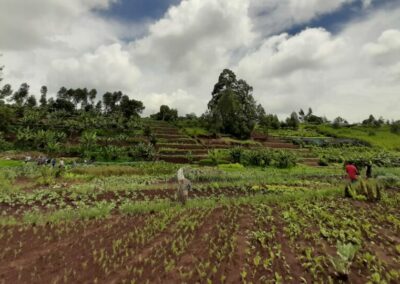 synthetic fertilizers. We follow the principles of Permaculture and regenerative farming.
synthetic fertilizers. We follow the principles of Permaculture and regenerative farming.
For individual households in Nairobi we deliver weekly farmshare baskets with a variety of fresh vegetables. We literally share the harvest with our ‘share-holders’. The basket comprises of at least 10 varieties and changes weekly, depending on availability. One basket is enough for 4 or 5 meals.
Following Mlango Farm’s commitment to sustainability, reducing our carbon footprint, and supporting greener living, we deliver the baskets by electric bicycle, to different areas in Nairobi.
Mlango Farm grows the following vegetables, herbs, and a few fruits: Arrowroot, Avocado, 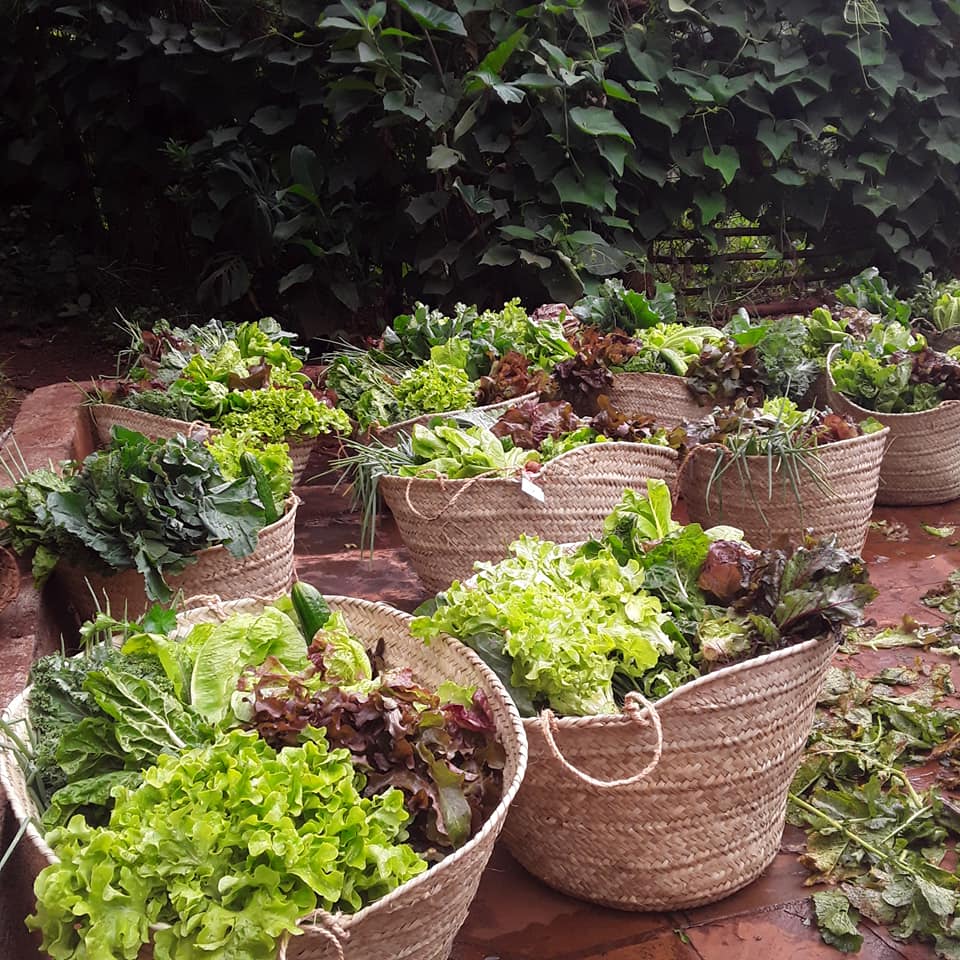 Baby Carrot, Bananas (+ matoke), Beetroot, Borage, Broccoli, Cabbage, Cauliflower, Carrots, Celery, Cherry tomatoes, Chinese cabbage, Chioggia, Chives, Chayote, Courgette, Cucumber, Daikon, Dhania/Coriander, Eggplant, Fennel, Green capsicum, Kohlrabi, Leek, Lemongrass, Lemon Verbena, Lettuce (12 different types), Mint, Mizuna, Nasturtium, NewZealand Spinach, Pakchoi, Parsley, Peaches (only in November), Radish, Red Cabbage, Rosemary, Rucola, Sage, Savoy cabbage, Spinach, Spring Onion, Sukuma Wiki, Sweet potato, Swiss Chard, Tarragon, Tatsoi, Tree tomatoes, Turnips, White Sapote.
Baby Carrot, Bananas (+ matoke), Beetroot, Borage, Broccoli, Cabbage, Cauliflower, Carrots, Celery, Cherry tomatoes, Chinese cabbage, Chioggia, Chives, Chayote, Courgette, Cucumber, Daikon, Dhania/Coriander, Eggplant, Fennel, Green capsicum, Kohlrabi, Leek, Lemongrass, Lemon Verbena, Lettuce (12 different types), Mint, Mizuna, Nasturtium, NewZealand Spinach, Pakchoi, Parsley, Peaches (only in November), Radish, Red Cabbage, Rosemary, Rucola, Sage, Savoy cabbage, Spinach, Spring Onion, Sukuma Wiki, Sweet potato, Swiss Chard, Tarragon, Tatsoi, Tree tomatoes, Turnips, White Sapote.
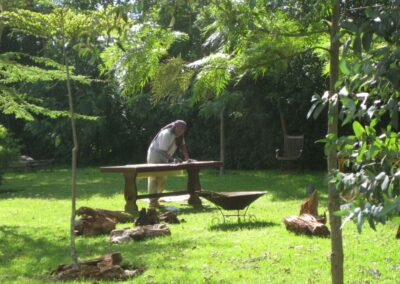 The Home Art Gallery at Mlango Farm is run by Njee Muturi (of Zanji Art). The collection consists of a wide range of African art: paintings from known and less known (mainly Kenyan) artists, masks, sculptures and wood carved furniture. Often we have an ‘artist in residence’ staying with us at the farm. We also organize workshops on ‘nature print’ and we support the Ngecha Artists group with workshops with different materials and different techniques.
The Home Art Gallery at Mlango Farm is run by Njee Muturi (of Zanji Art). The collection consists of a wide range of African art: paintings from known and less known (mainly Kenyan) artists, masks, sculptures and wood carved furniture. Often we have an ‘artist in residence’ staying with us at the farm. We also organize workshops on ‘nature print’ and we support the Ngecha Artists group with workshops with different materials and different techniques.
Our Host has been a COB-aholic for a long time and while her staff have made a Kenyan-style cob house with stick framing, now Els and her team will get to experience Euro-American-style cob building as taught by CruzinCobGlobal and built by the workshop students.
- ãW
THE PROJECT
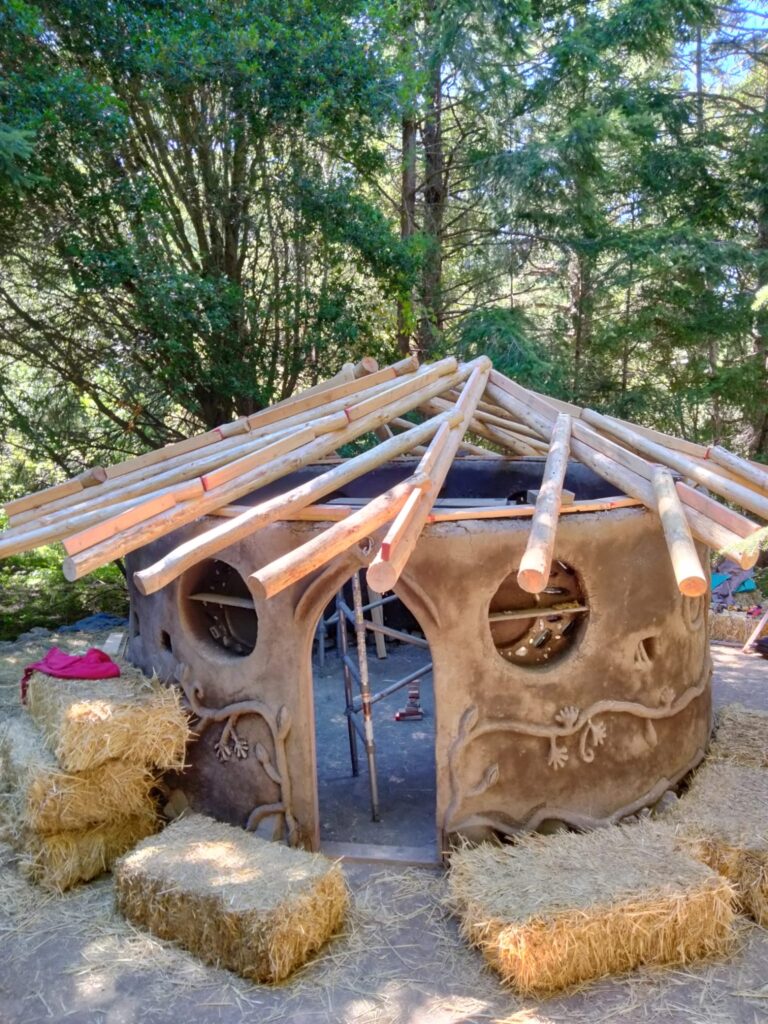 We will be building a 14m2/150ft2 round Cob Community Space for the temporary volunteers and visitors as well as the permanent residents of Mlango Farm to meet as a community for Council Circles, Healing Work, classes, trainings, meditation, ceremonies and other personal activities . The reciprocal roof we build in all of our workshops symbolizes an interdependent community in which all are equal at their essence. It is the strongest roof there is due to its interlocking spiral structure, which reflects the individuals sitting together below and the strength of their interconnection. It represents the horizontal social structure favored in indigenous and traditional societies.
We will be building a 14m2/150ft2 round Cob Community Space for the temporary volunteers and visitors as well as the permanent residents of Mlango Farm to meet as a community for Council Circles, Healing Work, classes, trainings, meditation, ceremonies and other personal activities . The reciprocal roof we build in all of our workshops symbolizes an interdependent community in which all are equal at their essence. It is the strongest roof there is due to its interlocking spiral structure, which reflects the individuals sitting together below and the strength of their interconnection. It represents the horizontal social structure favored in indigenous and traditional societies.
Students in this Advanced Cobber Certification training will, as always, learn all the steps to building a complete Cob Building from scratch in the following order:
Week 1: digging the trench and building a stone foundation and building the first floor layers
Weeks 2 & 3: building a circular monolithic cob wall with all its detailed insertions with sculpting
Week 4: plastering the inside and outside of the wall & building the primary rafter structure
Week 5: completing the wood roof structure, green roof, the top of the wall & the 2nd floor coat
We especially invite non-White and multiracial students to come learn the art and technique of cob building with CCG in Kenya, in the Motherland of Humanity. We want a workshop that feels comfortable for non-white students, and in which there is a healthy balance of races and cultures. CCG has taught in many countries of the world and our mission is to create access to everyone interested, especially the local people so we can create international cob building families. We aim to create intercultural and interhuman bonding experiences through our Cob building workshops to heal the world one Cobber and one Cob house at a time. So please listen to your Soul Calling and the excitement of your Heart when thinking of joining us in Kenya or anywhere else we are teaching, and come and embark on a life-changing adventure in 2025. And be part of creating a New World…
DETAILED WORKSHOP DESCRIPTION
The 35-day Advanced Cob Building Workshop consists of 25 days (Monday through Friday) of learning & construction for 4 hours in the morning and 3 hours in the afternoon with theoretical instruction (lectures with graphics) on most Monday, Wednesday and Friday afternoons to complement the hands-on experience.
Students arrive on Sunday between noon and 2pm and settle in. The workshop begins at 4pm with the Opening Circle followed by a Host Site Orientation and Introduction to the Project. Dinner is served at 6pm, and will be followed by an Introduction to the 5-week Workshop by Instructor Claudine Desiree and Assistant Tania de Froberville. Monday morning we begin digging the trench for our Cob Building!!!!
Following Breakfast from 7:30-8:15am, the morning learning/building session begins at 8:30 am and lasts until 1pm with a 20-minute snack pause at 11am. Lunch break is from 1pm to 2:30pm, which includes a rest time before the 3-hour afternoon session begins. Most Mondays, Wednesdays and Fridays there is a 60-minute lecture, followed by another session of construction and demonstrations. Tuesdays and Thursdays students begin the building and learning session again right after the rest time. After class in the afternoon there is a 90-minute break before dinner (served from 7pm to 8pm), in which students are encouraged to stretch, do some type of relaxation/movement practice, go swimming, walking and just relax.
There is sometimes a work trade student officially or informally leading yoga and movement practice in the mornings or afternoons (depending on student preference). There will also be 3-4 evenings (once a week) after dinner for showing slides, videos and having Course-related discussions. Other evenings are mostly free and sometimes students offer informal courses in their specialties and passions and we will also enjoy local music and dance, fire, singing and whatever other surprises our Host Nyakio has in store for the group. Tuesdays are reserved for our weekly Council Circle, where we do a deeper sharing and listening to attend to the inner worlds of our students, staff & Host(s). This is a required and essential element of our workshops to keep a balance between the physical work and emotional/spiritual needs that will come up, in a safe and intimate setting.
On weekends students are free to explore the area, rest onsite, and even continue building, subject to Instructor approval. All weekend meals are provided by students themselves, who are welcome to use the kitchen. Host and/or other students can carpool into town for weekend food provisions. Students are encouraged to visit the surroundings and eat in local eateries and will be guided by Nyakio. Also there will be information and transport options available for those who want to go on weekend getaways to see other parts of Kenya. These are always an additional cost of course.
The 35-day Course will offer practical learning by building a complete 15m2 curvilinear building from foundation to roof, as
described in the “Project” section. Those who complete the 35-day Workshop will receive an Advanced Cobber Certificate of Completion for Foundation, Cob Walls (which includes Door, Windows, Shelves, Art, Electrical Housing & Plumbing preparation), Floor, Plaster & Roof. Students who have to miss more than ONE day of the workshop will receive a temporary partial Certificate naming the parts they have completed and will need to complete all the missed time in another workshop to get the final Certificate.
DAILY SCHEDULE
The Advanced Cob Building Workshop begins on a Sunday at 4pm and ends on a Sunday, 5 weeks later, after the morning Closing Circle & Brunch. International students should arrive a day or two before Sunday to acclimate and settle in (please let us know) but will need to cover their own food needs unless a work trade or payment option is approved by Host (to be decided closer to the date).
The daily schedule (subject to slight modifications due to climate/time of year) will be:
7:30-8:15 Breakfast
8:30-1:00 Class
1:00-2:30 Lunch
2:30-5:30 Class (Lecture on MWF’s)
5:30-7:00 Rest/Yoga
7:00-8:00 Dinner
8:00-9:00 Slides/Videos/Discussion (once a week)
Students are expected to be ON TIME and participate in ALL sessions and required activities as the goal of completing a full construction depends on the whole group being present and working together: physically, energetically, emotionally.
COURSE CONTENTS
Students will learn every phase of building a cob building from foundation through the reciprocal roof in hands-on building and lectures/theory. In addition to the lectures, slideshows and videos will be shown to support and enhance their understanding of cob materials, cob building, design, geography, budgeting, business options and legal issues.
Our hands-on practice will include:
digging foundation trench
pouring gravel and inserting drainage pipe (if applicable)
building foundation stemwall
analyzing soils and materials
making test bricks
deciding on correct mixture
deciding on best location
making cob w/ partner and solo
building with cob
preparing and inserting the door
preparing and inserting fixed and opening windows
preparing and inserting shelves
inserting bottle windows, glass and other objects
inserting electrical housing and outlet/switch boxes (when applicable)*
insert PVC pipe for plumbing in walls (when applicable)*
sculpting
preparing and applying earthen plaster (1 coat)
pouring an earthen floor (2 coats)
preparing walls for roof connection
building reciprocal roof frame
putting on roof sheathing and other elements
installing green roof
making small-scale cob designs of future projects, time permitting
In addition to Cob Building practices, the Course material
also includes:
legal cob construction practices & the international cob code (Appendix AU in the IRC)
cost analysis
creating a cob business (building/teaching)
assisting, interning and teaching with CruzinCobGlobal
*While the insertion of electrical housing and one or more outlet/switch boxes and PVC pipes to hold plumbing are always included in the workshops, the simplicity or complexity depends on the host’s design and preferences. There will be no electrical wiring or plumbing pipes installed during workshop. That is beyond the focus of this course and requires professional experience and certification/licensing.
REQUIREMENTS & IMPORTANT INFORMATION
Students will need to come prepared for demanding physical work from Day 1.
This includes bringing:
Work clothes appropriate for the country and climate we are in
Work boots or other closed-toe shoes (for foundation and roof)
Flip-flops (for cobbing/plaster days)
Rubber dishwashing gloves (for lime mortar)
Work Gloves (for stone work)
Tape Measure
Box Cutter
Wood Hand Saw (cheap)*
Level (2ft)*
Hammer*
Japanese plastering trowel(s) (email:goldhillclayplaster@gmail.com)
Ear Plugs (roof week)
Wood Chisel*
4”-6” Diameter Round Plastic Container Lids (for plastering)
Good Moisturizer
Hat
Sunglasses
Water Bottle
Notebook/Pen/Camera
Safety Glasses
Carpenter Pencil & Sharpener
Sample of your Soil (optional)
Any other power tools like skillsaw, grinder with metal blade, cordless drill, chop saw…will be very welcome if you are driving in and able to bring them.
*These tools will be very helpful to bring if you can, to minimize sharing and waiting, but if you can’t because you are flying in, the Host will provide them of course.
***VERY IMPORTANT INFO***
These workshops are designed for people that want to learn how to build a complete structure from start to finish in a professional manner and timeframe. They are very intensive and, while we make time for yoga, stretching, dancing, music, relaxing….all students are expected to be present and participating in ALL building and lecture learning hours unless absolutely incapable due to illness or have some other significant/emergency reason. This is because we design the size of the building
and organize the structure of the workshop in accordance with the number of students we will have, and when people are absent it impacts the whole group and the other students have to work harder. In addition Instructors try to set up building work according to students’ preferences and learning needs.
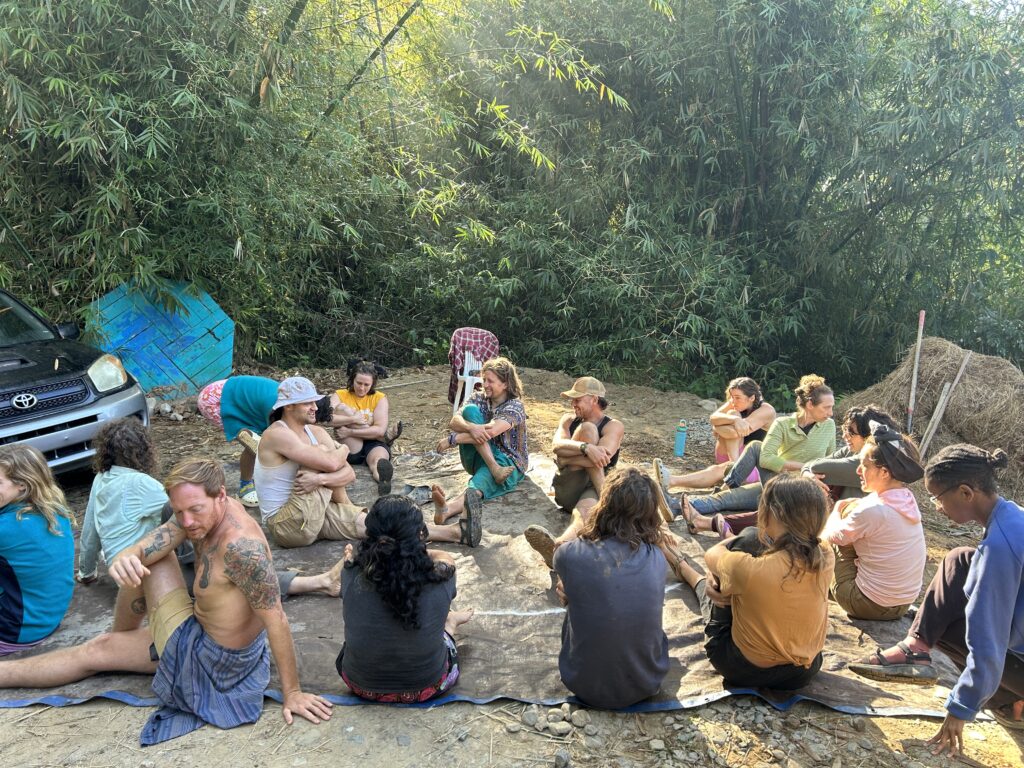
Morning stretching is critical to a successful workshop and creates time for meaningful connection before starting the day
We need and depend on everyone’s full participation in each day of the workshop. This is a total group effort on all levels: physically, mentally, emotionally and energetically.. If someone is physically absent from the site and lectures due to illness or other urgency for more than one full day, they will need to make up the days missed in a subsequent workshop to receive the complete Certificate (and will only pay food costs). If physically injured or ill (and capable), it is requested students be present at the site and for lecture and other required evening activities to not miss out on information and learning by observation, and to qualify for the Certificate. For those who have any disabilities that may interfere with these requirements and would like to participate in the workshop, please contact Claudine.
The workshop intensity changes from week 1 to week 5 with the focus of the week. The first foundation week breaks people in with the work of moving, lifting, rolling and placing rocks and is a new and demanding physical experience for most students. It also includes the first layers and coat of cob floor. The second week and part of the third week of cob making and building are similar to the rock foundation week in physical demand but are more flowing and active in movement and cardiovascular exercise. On Thursday & Friday of week 3, the workshop takes a turn and slows down and the body can rest as students their creative source now and design and sculpt the walls and around niches, shelves, windows, etc. This is a very special rewarding experience and time of the workshop, decorating the walls with visual beauty and meaning as expressed by each unique student. Usually there is an overarching theme decided on by Host(s) but sometimes students are free to create the theme and design and present to Host.
Plastering follows sculpting and is also an enjoyable more lightweight physical experience that lends itself to talking and sharing at the wall in a meditative rhythm as the students have bonded and shared deeply through a variety of experiences for a month. On day 5 of week 4, the roof begins. This part is the beginning of a change of pace from the earthen building work to carpentry skills, power tools, drilling, hammering, screwing, trimming, etc. But now the workshop is in its final stretch and there is a boost of energy to wrap up the roof, close the top of the wall, and tend to finishing touches….the grand finale. The group also begins the process of letting go and tending to the new relations they have made and talking about the future.
For students wanting a more mellow slow-paced cob experience along with time for personal exploration and experimentation, these workshops are not for you. However you can find a more suitable workshop online with other organizations that are usually for a shorter period building a garden wall, a bench, a compost toilet or some other smaller scale project.
Students are required to read “The Hand-Sculpted House” and “Essential Cob Construction” (see website Resources page) before the workshop begins and any other books they find or listed on our Resources page, ideally on plastering and reciprocal roof building, as well as watching our “International Cob Workshop” videos on Claudine’s YouTube channel, the new educational YouTube series “Building a Mud Home” by Cooper Green, posted by Natural Buildings and created from our North Carolina workshop footage, and the ones posted on CruzinCobGlobal’s website under Gallery/Videos, to get an idea of what is expected. Also it is a great idea to watch as many other videos on cob and reciprocal roofs as you can, to come mentally prepared. Please bring your book(s).
Students must tend to their own personal needs, drink alot of water, rest when needed and exert themselves at a steady pace. Students who cannot do the strenuous physical work should let us know when registering so we can make sure the workshop is a good fit. If approved before the workshop begins, we can adjust appropriately. It is totally OK to come for the lecture/theory part, and sometimes help the building part in less physically
demanding ways if you have physical limitations, ie cutting straw, sifting for plaster, hammering nails into frames or shelves, sculpting, plastering, cutting bottles. There is alot to do to support making and building with cob!!!! But this has to be discussed and approved with Claudine so it does not impact the schedule of construction.
Finally, please bring a watch or use your phone to be prompt and ready for each part of the Course including meals. Please make sure you share your dietary restrictions/allergies with CCG in your registration form. Note that very demanding dietary needs will not be able to be met (vegan & non-gluten ok) and those students may be recommended not to participate unless they are willing to meet their special needs on their own, which will not include kitchen access on weekdays. Please discuss with Claudine at time of desire to register. Also please bring your essential snacks and foods, pillow and whatever you NEED to be comfortable and happy. Feel free to also bring playlists, speaker, slides, videos, movies and books to share, as well as a sample of your soil to test.
We look forward to opening you to a whole new world of experience, skill, growth and transformation as you bond with your new international COB family for life!
MEALS & ACCOMMODATIONS
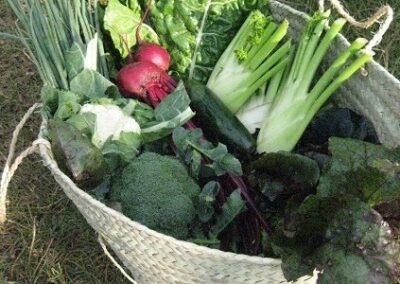 We will serve three meals a day from Monday through Friday including the Welcome and Celebration Dinners and Farewell Brunch. Weekends students can either be on their own for food and may use the onsite kitchen, or choose to have meals made by the staff for a rate of 15€/day or 3€ for breakfast and 6€ for lunch or dinner. Meals will be mostly vegetarian and locally-based as much as possible, including farm produce and eggs, but we will attend to meat eaters several times a week if desired!
We will serve three meals a day from Monday through Friday including the Welcome and Celebration Dinners and Farewell Brunch. Weekends students can either be on their own for food and may use the onsite kitchen, or choose to have meals made by the staff for a rate of 15€/day or 3€ for breakfast and 6€ for lunch or dinner. Meals will be mostly vegetarian and locally-based as much as possible, including farm produce and eggs, but we will attend to meat eaters several times a week if desired!
We will also attend to vegan and gluten-free diets if needed but any other restrictions & allergies that require extensive preparation needs will not be able to be honored. Kitchen will not be accessible on weekends for students, but there are plenty of places to eat in the surrounding neighborhoods!
Camping in your own tent is free and available for everyone. Please bring your camping gear. Our host is also offering a limited number of beds (first come first serve) in various locations on the Farm. The fee will be 6€/night. Students can buy camping gear or just blankets in Nairobi with the help of our host if they don’t want to travel with it.
TRANSPORTATION
International students will fly into Jomo Kenyatta International Airport (NBO) in Nairobi and can share an Uber or Bolt (cheapest) to the site, an hour away. The distance to the site is only 25 miles/40km from Nairobi. Students should arrive on Saturday and can eat with the residents before the workshop for a small fee or choose to have meals prepared for a larger fee or bring their own food to make.
ADDITIONAL IMPORTANT TRAVEL INFORMATION:
ELECTRONIC TRAVEL AUTHORIZATION (ETA)
As of January 1st, 2024, all foreign nationals, regardless of nationality, can enter Kenya without a visa for tourism or business travel for stays up to 90 days.
However, you must obtain a new Electronic Travel Authorization (ETA) online prior to travel.
To apply, visit the ETA Platform. Please note that this is the only website you should be using, any other website you may find on Google is a scam!
The ETA costs $30, is valid for 90 days from the day when you make the payment (i.e. the day you apply) and it takes about seven days to be processed and approved.
Hence, we recommend to apply around two weeks before the trip.
The ETA is only valid for one trip and travelers must obtain a new ETA for each visit to Kenya.
Make sure your passport is still valid for at least 6 months after your planned trip and that you have at least two blank pages.
If you plan to travel to other East African countries, it may make sense to get an East African visa.
It’s best to print your ETA and have a paper copy.
VACCINES
There is no mandatory vaccine required to enter Kenya, unless you are arriving from countries where yellow fever is endemic. In that case, you will need a valid yellow fever certificate.
If you are arriving from Europe, Mauritius or the USA, you will not need a yellow fever or any other vaccine, however there are a few recommended ones.
Please visit the Travel Health Pro website for more info.
With regards to Malaria, Kenya is not on the list of the high risk countries. As a result, the choice of taking Malarone (or any other drug) as a prevention is very personal.
Please consult your GP should you have any more questions.
TRAVEL INSURANCE
We recommend anyone to get a Travel Insurance to cover your trip in Kenya.
You can refer to Europe Assistance or World Nomads as providers.
COB INSTRUCTOR
Claudine Desiree
Founder and Director of CruzinCobGlobal, Claudine Desiree has been well-known in the world of Cob Workshops for 20 years, since holding her first workshop in her downtown Santa Cruz, California home in 2004. After many years in California teaching shorter-format workshops, in which part of a building was built or finished, while holding many careers and raising her three sons, she launched her GlobalCobTrotter Tour in December of 2014, and realized a life-long dream of traveling the world by bike for an extended period of time. To keep earning a living while combining her two passions, she decided to organize cob workshops on the road in all the countries she wanted to bike to and through. The journey ended up going for 5 years in which 30 workshops in 15 countries were held, in Africa, South America,
Europe and the US. The new CruzinCobGlobal was born in 2015 with a website and a new seriousness and organization and consistency that have, together with the unusual goal of building a complete cob cottage in 5 weeks from feet to head and all the fixins in between, brought CCG its global reputation as the only and best complete and intensive professional cob training in the world today.
At this point, and after creating her first Cob Ecovillage, “Quinta da Vida Beleza” from 2020 to 2023 in the Azores, with workshop students and others, she has now stepped back from the teaching role to honor and train her best students on this path. However, when the workshop takes place in a new location of interest, like Kenya, she may decide to step in for old time’s sake, to keep stoking her passion and love of international cob teaching!
COB ASSISTANT
Zoë Verbaant
Hi! I’m Zoë, 34, I’m from the Netherlands, and currently I live wherever I lay my head down.
I have always been very passionate about the world, nature, humanity, and how everything is related. As a child I would philosophy about these topics. I was fascinated with indigenous tribal peoples living exclusively of the land they walk on. I dreamed of living like that too, in a house made of bamboo, or mud, that I’d built myself.
Growing up, I ‘did life’ differently than the people around me, trying to follow my passions. I eventually studied ecology, nature and wildlife management, dreaming to contribute to conservation of primary ecosystems. I’d travel everytime I had managed to save up with waitress jobs. Not only because I love exploring every corner of the world, also because of my strong need to put my energy into conservation related projects. Through these endeavours I eventually ended up volunteering at a place in Spain, in 2015, where 2 elderly people were re-designing their lifestyle to a more connected life, and that included natural building – restoring the ruined dry stone wall buildings.
I loved doing that, and in 2017 I joined a massive earth bag build in Australia, that also incorporated rammed earth walls and a cob oven. It was a very beautiful holistic experience. And somehow it felt as though I had built like it before. A puzzle piece fell in place.. From then on, in my travels I would often look for opportunities to build, restore or beautify people’s homes, slowly learning more, gaining skills, growing as a person and feeding my soul. I’ve been interested in all the different possibilities within the concept of natural building…. and there are many.
Besides the above, I worked on 2 hempcrete builds in the Netherlands, a round timber frame gazebo with reciprocal green roof in France, restoring an old wattle/daub tudor house in Germany, a co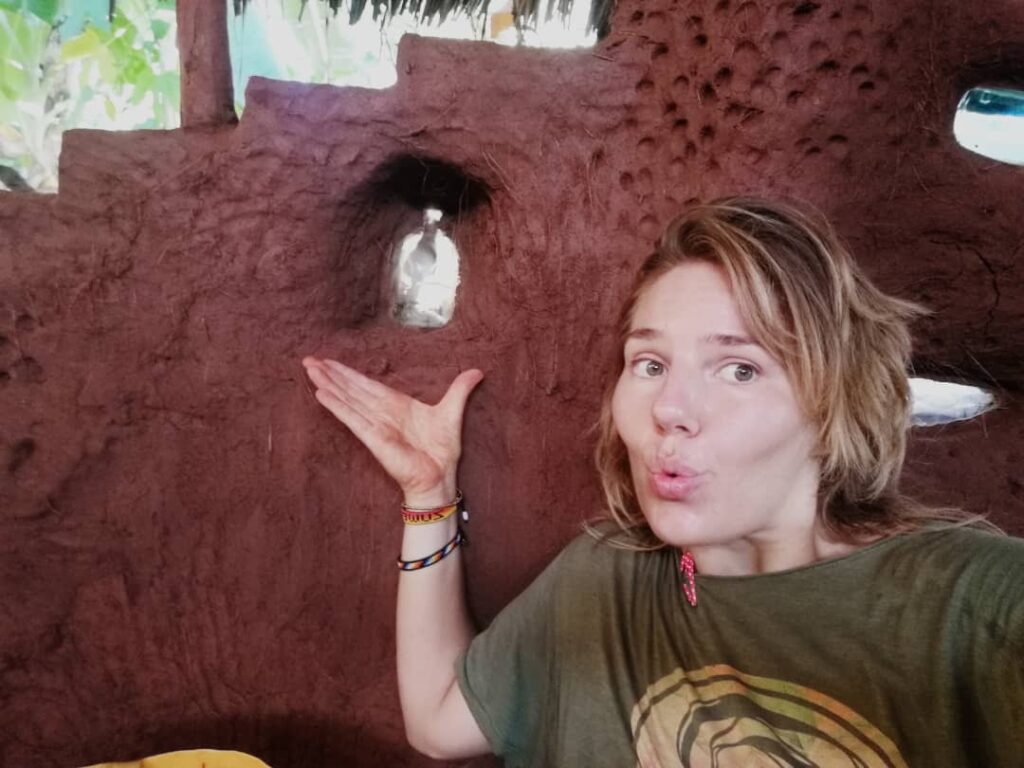 b roundhouse in Spain. And a month ago a mud brick house in Thailand. I have done several plastering and paint jobs here and there, using earthen and lime mixes. Adding to that I have done some small works, learning about slip straw, pallet cob, scrafito and other plaster murals, tadelakt and building rocket mass heaters.
b roundhouse in Spain. And a month ago a mud brick house in Thailand. I have done several plastering and paint jobs here and there, using earthen and lime mixes. Adding to that I have done some small works, learning about slip straw, pallet cob, scrafito and other plaster murals, tadelakt and building rocket mass heaters.
I joined the Cruzing Cob Global cob house and oven+bench workshop, on Sao Miguel in 2023. I really wanted a start to finish experience, combining all the techniques involved. It gave me a big boost in my building skills and I made great friendships.
Moving on from there I felt confident I could have a go at designing and teaching building, which I did in Tanzania. We made a gazebo style classroom with coral rock, earth and wood.
And now it’s very exciting to continue the journey of sharing the knowledge, with CruzinCobGloblal, in Kenya, alongside Claudine.
I know we will have an amazing time.
REGISTRATION & PAYMENT
Very Early Bird Rate: 2250€, paid in full by November 9th, 2024
Early Bird Rate: 2350€, paid in full by December 31st, 2024
Standard Rate: 2450€, paid in full by January 26th, 2025
We are offering 2 work trade positions which give you a 250€ discount on either food or tuition for working one hour each weekday preparing the building site from 6:30AM to 7:30AM. These are the first options to go. Depending on when you pay in full, the discount is taken off the appropriate amount.
Payment can be made in Euros using Wise to CruzinCobGlobal at the following IBAN: BE44 9673 1046 6145 or to claudinedesiree@gmail.com at Venmo, Paypal (including the transaction fee) or Zelle with current Euro to USD conversion.
Please contact claudine@cruzincobglobal.org or on Whatsapp +1(831) 212-7225 to register and ask any questions.
To hold your spot (there are 12 for new students and 3 for returning students), you can make a 50% deposit. The balance owed depends on the date of payment in full. Final payment deadline is January 26th, 2025.
Special Note:
Local, Kenyan and African students with a locally-sourced income and with full-time residence on the African continent:
Tuition and Weekday Meals: 1525€ (accommodations & weekend meals extra)
Camping with own equipment is free (2 tents available to borrow from Host)
Bunkbed: 6€/night
Weekend meals: 15€/day (Breakfast: 3€ Lunch: 6€ Dinner: 6€)
We are working to complete our 4th 1000€ scholarship for a local very motivated Kenyan student Students will need to make the food payment with their own funds or raising money on their own.
Please help this happen by supporting our GoFundMe fundraiser here: (link coming soon)
Gratitude
CANCELLATION POLICY
Students who have paid and cancel by December 9th, 2024 can get a full refund minus a 5% administrative/inconvenience fee on the amount they have paid.
Students who have paid and cancel by January 9th, 2025 will receive a credit for a future workshop within two years minus a 10% administrative/inconvenience fee.
Students who have paid and cancel after January 9th, 2025 will NOT receive a refund or credit unless they have proof of an emergency situation or other reason out of their control, in which case they will receive a credit for two years minus the 10% admin fee.
CAN’T WAIT TO GET MUDDY WITH YOU!!!!
Location: Mlango Farm
